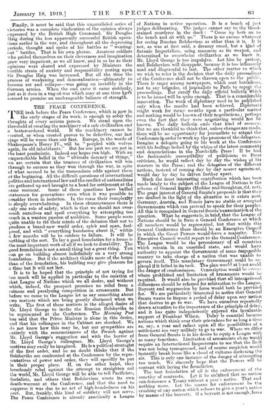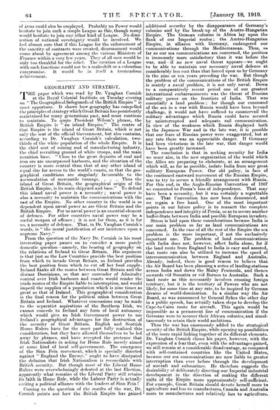THE PEACE CONFERENCE.
r HE task before the Peace Conference, which is now in 4. the early stages of its work, is enough to sober the thOughte of every serious person. We stand upon the threshold of creating the machinery of a safe civilization and
a better-ordered world. If the machinery cannot be created, or when created proves to be defective, our last stage will be worse than our first. Europe, in the words of Shakespeare's Henry IV., will be " peopled with wolves again, its old inhabitants." But for our part we are not in the least pessimistic. Indeed our hopes run high. With an unquenchable belief in the " ultimate decency of things," we are certain that the trustees of civilization will win through to success as they won through the war, in spite of what seemed to be the tremendous odds against them at the beginning. All the difficult questions of international politics and international law and the conflict of nationalities are gathered up and brought to a head for settlement at the same moment. Some of these questions have baffled statesmen for generations even when it was possible to consider them in isolation. In the mass their compl
is simply overwhelming. In these circumstances there only one rule of safety, which is that we should not over reach ourselves and spoil everything by attempting too much in a wanton passion of ambition. Some people seem quite unable to rid their minds of the delusion that not to produce a brand-new world order, spick and span, fool- proof, and with " everything handsome about it," within a few months will be to confess to failure. It will be nothing of the sort. To lay a good foundation for a house is the most important work of all if we look to durability. The good foundation is not a small thing but a great thing. You can go on building almost indefinitely on a very strong foundation. But if the architect thinks more of the hogs° than of the foundation, his building may give pleasure for a time but it will not last.
It is to be hoped that the principle of not trying for too much will be applied in particular to the creation of that League of Nations which we all desire, and without which, indeed, the prospect promises no relief from a ruinous and paralysing competition in armaments. But before we come to the League let us say something about two matters which are being greatly discussed when we write. The first of these matters is the alleged desire of Mr. Lloyd George to invite the Russian Bolsheviks to be represented at the Conference. The Morning Post has said that the Prime Minister is alone in this desire, and that his colleagues in the Cabinet are shocked. We do not know how this may be, but our sympathies are entirely with the remonstrances of the French against Mr. Lloyd George's suggestion and with the horror of Mr, Lloyd George's colleagues. Mr. Lloyd George's motives may easily be imagined. He is a political strategist of the first order, and be no doubt thinks that if the Bolsheviks are confronted at the Conference by the repre- sentatives of power and order, they will speedily be put in their properplace. If, on the other hand, they ferociously re 1 against the attempt to straighten out the world, Mr. Lloyd George will be able to tell Paciflcists, Socialists, and others that Bolshevism wrote its own death-warrant at the Conference, and that the need to suppress it was due to no act of high-handedness on his part. But, frankly, this kind of subtlety will not serve. The Peace Conference is already practically a League
of Nations in active operation. It is a bench co: just judges deliberating. The judges cannot say to the blood- stained murderer in the dock : " Come up herb on to the bench and sit with us." There is no excuse whatevef for seeing Russian Bolshevism as other than it is, It Li
not, as was at first said, a dreamy creed, but a hind of
Satanic Imperialism, using massacre as its wennell, awl determined to overwhelm civilization as we knout it. Mr. Lloyd George is too impulsive. Let him bo patient., and Bolshevism will disappeir, because it is too inherently mad and disgraceful to laet. The other matter to which we wish to refer is the decision that the daily proceedings of the Conference shall not be thrown open to the public. There is anger among newspapers, which sent battalions,
not to say brigades, oflournalists to Paris to repgt the proceedings. But surel the daily ollicial bulletin which is to be issued will be qu to enough, That is a considerable
innovation. The work of diplothaey used to be puhlished only when the resmts had been achieved. Diplonat$ might work for many months upon a particular mattes and nothing would be known of their negotiations ; perhaps even the fact that they were negotiating would not be known. The daily bulletin ends that kind of secrecy. But we are thankful to think that, unless changes are made, there will be no opportunity for journalists to attend the Conference in order to work up the passions of the delegates. Imagine a delegate going to his work at the Conference with his feelings lashed by the whips of the latest comusenti and denunciations in the orthclifle Xressl If he ha the fashionable susceptibility of politicians to Press criticism, he world reflect day by (Ay the wills; pf his masters in the Press ; and the delegates of the different nations, instead of coming day by day nearer agreement, would day by day be driven further apart.
Much the most interesting contribution which has been made lately to the subject of the League of Nations is the scheme of General Swats (Hodder and.Stoughton, ed. net). The great interest of General Smpts's proposals is that they are drafted in the light of the situation as it exists now. Germany, Austria, and Russia have no stable or accepted Governments which can pretend to speak for their peoples. All this is recognized in General Smuts's examination of the question. What he suggests is, in brief, that the League of Nations should be in form a General Conference at which all members would be represented, but that within this General Conference there should be an Exectitive Co cif in which the Great Powers would-have a majority. This Executive Council would report to the General conference. Th? League would be the Teyersionary of alloquntries which remain in an unsettled state, and would have authority to appoint the Government of some responsible country to take charge of a nation that was unable to govern itself. This mandatory Government could be re- placed if it failed in its task. The plan would at least avoid the danger of condcmeinium. Conscription would be every- where prohibited and limitation of armaments would ho required. It would also be provided that all international differences should be referred for arbitration to the League. Boycott and suppression by force would both be provided for. We are particularly interested to notice that General Smuts wants to impose a period of delay upon any nation that desires to go to war. We have ourselves repeatedly drawn attention to the importance of the principle of delay, and it has quite independently enjoyed the invaluable support of President Wilson. Delay is essential because nations which think over their grievances for as to a time as, say, a year and reflect upon all the possibilities of a settlement are very unlikely to go to war. Where we differ from General Smuts is in his desire to equip a League with so many functions. Limitation of armaments alone woulvd require an International Inspectorate to see that the limit was not being transgressed, and of course suspicion woulil instantly break loose like a cloud of vultures darkening the air. This is only one instance of the danger of attempting too much. We sincerely hope that the Powers will he content with laying the foundation. The beat foundation of all is the enforcement of the sanctity of contracts. Let it be ordained that no nation can denounce a Treaty without a year's notice. That and nothing more. Let the means for enforcement be the crushing of any nation which refuses to give a year'a notice by means of the boycott.. If a boycott is not enough, force
of arms could also be employed. Probably no Power would hesitate to join such a simple League an this, though many would hesitate to join any other kind of League. No dimi- nution of national sovereignty would be involved. We feel almost sure that if this League for the enforcement of the sanctity of contracts were created, disarmament would come about by agreement among the various Ministers of Finance within a very few years. They of all men would be only too thankful for the relief. The creation of a League with such functions would not be a makeshift or a colourless compromise. It would be in itself a tremendous achievement.



































 Previous page
Previous page